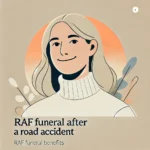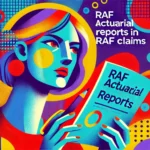2023 was a rollercoaster year across South Africa. The Road Accident Fund (RAF) has been at the epicentre of the country’s public discourse.
The legal battles, financial woes, and administrative reshuffles paints a complex picture for RAF. From the introduction of the much-debated RAF Amendment Bill to the rising tension between medical aids and the Fund, the year has kept the RAF in the headlines.
As we dive into the top 10 news stories about the RAF, we’ll unravel a complex tapestry of challenges and changes. These stories not only reflect the Fund’s struggles but also cast a light on broader issues of road safety and social justice in South Africa.
Hold on as we journey through a year that challenged the RAF mandate like never before.

Tabling of The Road Accident Fund (RAF) Amendment Bill 2023
Overview: The Draft Bill and Its Provisions
Introduction
September 2023 marked the publication of the draft Road Accident Fund Amendment Bill 2023 by South Africa’s Department of Transport.
This bill has already stirred widespread debate. It aims to overhaul the existing compensation framework of the RAF.
Key Changes in the Bill
- Transition from Compensation to Social Benefits: The Bill aims to shift the RAF’s traditional role as a statutory insurer compensating for actual damages, to a system providing structured social benefits.
- Coverage Restrictions: The proposed law narrows the scope of coverage. It also limits claims to injuries on public roads. It excludes private road incidents, non-citizens, and alcohol-influenced accidents.
- Elimination of General Damages: The draft eliminates compensation for pain, suffering, and other general damages, regardless of the severity of the injuries.
- Changes in Compensation Structure: Instead of lump-sum payments, the Bill proposes annuity-based payments for loss of earnings or support. This includes the possibility of continual reassessment by the Fund.
Implications: Impact on Stakeholders
Impact on the Public and Vulnerable Groups
- Challenges for the Poor and Disempowered: The largest impact is expected on the poor, who rely heavily on public transport. With limited social benefits and no lump-sum payments, many will find themselves pushed into the public health system. The prescribed tariffs might not cover private healthcare costs.
- Reduced Legal Recourse: The Bill restricts the right to seek compensation from the person responsible for the accident. This uniquely disadvantaging road accident victims compared to victims of other types of accidents.
- Potential Increase in State Dependence: The proposed changes are likely to lead to a greater reliance on state support. Especially for those unable to achieve financial stability following an accident.
Impact on the Legal and Medical Sectors
- Medical Aids and Insurance: The amendments could lead to significant changes in how medical aids handle accident-related expenses. This could potentially impact both the schemes and their members.
- Legal Representation and Dispute Resolution: The establishment of an RAF Adjudicator and the proposed alternative dispute resolution procedures will limit access to courts. This affects how claims are settled and could prolong the resolution process.
Economic and Administrative Implications
- Financial Strain on the RAF: Despite these sweeping changes, there’s no clear indication that the amendments will address the RAF’s financial and administrative challenges.
- Operational Overhaul: The RAF will need to adapt to running two systems in parallel. The current compensation system and the new social benefits system. This duplication may actually increase the administrative and financial burden.
Key Questions Going Forward
The RAF Bill is likely to dominate the news conversation in 2024. Especially as this is an election year. Key items which need to be addressed include:
- How will these changes affect the constitutional rights of accident victims?
- Can the government ensure road safety and fair compensation for road users?
- Who will be the most affected by these amendments – the victims or the taxpayers?
| How does this affect you? The Bill may limit claim eligibility and compensation types, affecting victims’ access to fair and adequate settlements. |
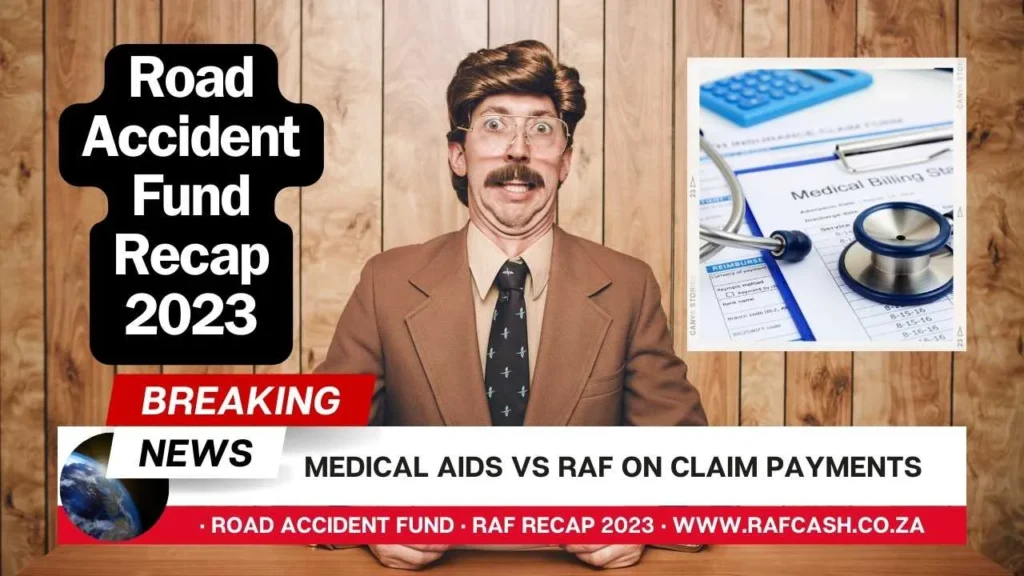
Medical Aids Vs RAF on Claim Payments
Conflict Details: The Dispute Unraveled
The Heart of the Conflict
At the core of the dispute between Discovery Health, South Africa’s largest medical aid, and the Road Accident Fund (RAF), lies a fundamental disagreement over claim payments. Discovery Health has accused the RAF of failing to reimburse medical expenses for patients treated after road accidents. This responsibility was traditionally undertaken by the RAF.
The RAF’s Stance
The RAF is grappling with financial constraints. As such they are eager to shed responsibility for payment wherever possible.
RAF argues that its primary focus is on direct victims of road accidents.
The Fund contends that medical aids should not expect reimbursements for treatments provided to their members. Especially given the RAF’s limited resources.
Discovery Health’s Argument
Discovery Health represent its members and their rights. They insist that the RAF’s refusal to reimburse medical expenses undermines the principle of fair compensation.
The medical aid argues that members’ premiums should not be burdened with costs that rightly fall under the RAF’s purview.
Stakeholder Perspectives: Voices from Both Sides
Discovery Health’s Viewpoint
- Financial Burden: Discovery Health emphasizes that the RAF’s stance unfairly shifts the financial burden onto medical aid schemes and, by extension, their members.
- Principle of Fair Compensation: The medical aid argues that its members, as road users, contribute to the RAF through fuel levies and deserve fair compensation in the event of road accidents.
RAF’s Perspective
- Financial Constraints: The RAF points to its strained financial situation, emphasizing the need to prioritize direct victims over reimbursements to medical aids.
- Operational Challenges: The Fund also highlights operational challenges. These include the processing of a high volume of claims and limited resources.
Broader Implications
- Impact on Healthcare Costs: The dispute has broader implications for healthcare costs in South Africa. This potentially affects how medical treatments is financed for road accident victims.
- Legal and Policy Considerations: The disagreement raises questions about the legal responsibilities of the RAF. As well as the extent of its obligations toward medical aids.
A Complex Dispute with Wider Ramifications
This section of the article delves into the intricate conflict between Discovery Health and the RAF.
The media will continue to monitor this. The broader implications for South Africa’s healthcare funding model and National Health Insurance (NHI) are obvious.
| How does this affect you? Disputes over reimbursements may complicate the process for victims to receive full compensation for medical expenses. |
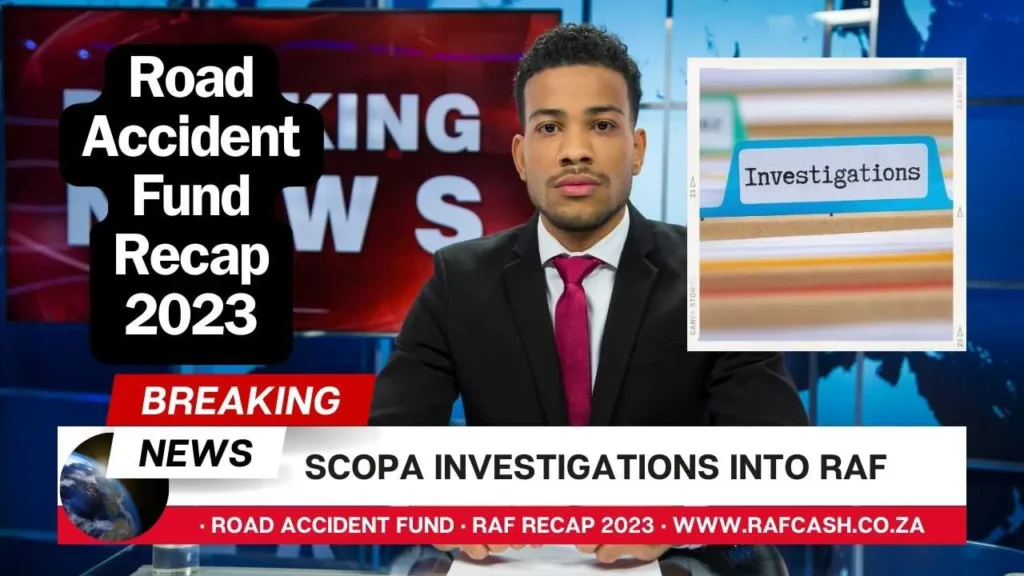
SCOPA Investigations into the State of the Road Accident Fund
Investigation Scope: Delving into the RAF’s Functioning
Unpacking the Inquiry
In an extensive oversight endeavor, the Standing Committee on Public Accounts (SCOPA) scrutinized the Road Accident Fund (RAF) in 2023.
Their investigation was aimed at dissecting the RAF’s responses to the Auditor-General’s audit outcomes and addressing concerns raised during oversight visits.
Key Areas of Focus
- Duplicate Payments and Legal Entanglements: SCOPA sought clarity on RAF’s handling of legal matters. They were particularly concerned about duplicate payments to attorneys and firms.
- Payment Issues with Medical Experts: The committee probed into the RAF’s contentious stance on not paying medical experts. The lack of direct relationship with doctors was highlighted.
- Employee Well-being and Organizational Culture: A significant aspect of the inquiry centered around the internal culture at RAF. Members perceived an environment of fear among employees.
- Operational Challenges and Claims Backlog: SCOPA delved into the backlog of unprocessed claims and operational inefficiencies within RAF offices. They echoed concerns about the poor service delivery from the fund.
Findings: Illuminating RAF’s Challenges
Transparency and Accountability Concerns
- Ambiguity in Legal Affairs: SCOPA noted a lack of specific information in RAF’s dealings with legal cases. Particularly around duplicate payments and actions taken against involved law firms.
- Employee Morale and Management Issues: The committee highlighted issues of low employee morale. They also noted a disconnect between RAF’s executive team and its staff. This points to a need for improved internal communications and support.
- Claims Processing and Backlogs: Investigations revealed a troubling backlog of unprocessed claims. Some date back several years! Systemic inefficiencies within the RAF need to be addressed in 2024 and beyond.
- Financial Management and Policy Disputes: Discussions also touched on RAF’s financial management practices. The Auditor-General was particularly concerned about its approach to accounting policies. (More on this below)
Recommendations for Improvement
The specific recommendations from SCOPA are currently pending.
It is evident that the RAF faces a call for greater transparency. This includes improved internal governance and more efficient claims processing.
| How does this affect you? Investigations highlighting RAF inefficiencies could lead to reforms, potentially improving claim processing and accountability. |
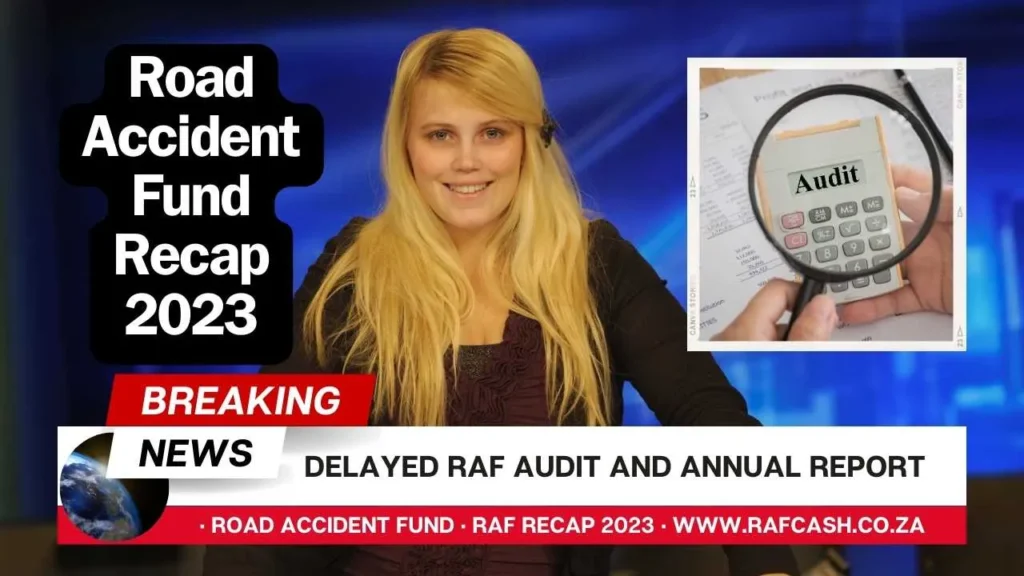
Auditor General and Delayed RAF Audit and Annual Report
Audit Status: Unpacking the Delay
Root Causes of Delay
In 2023, the Road Accident Fund (RAF) faced significant scrutiny when the Auditor General (AG) reported a delay in their audit and annual report submission. The reasons behind this delay were multifaceted:
- Complex Financial Management Issues: RAF’s shift to a new accounting policy, not in line with the standards set by the Auditor General and National Treasury. This created complexity in financial reporting.
- Operational Inefficiencies: Internal challenges within the RAF, such as claims backlogs and management issues, contributed to the delay.
- Disputes Over Accounting Standards: The RAF has chosen an unconventional accounting standard. This has led to disagreements with the Auditor General, complicating the audit process.
Communication Breakdown
A notable factor was the communication gap between the RAF and the Auditor General’s office. The RAF’s decision to pursue its preferred accounting policy without broader consensus led to prolonged discussions and legal disputes.
As a result audited financial results are still outstanding since 2021!
Significance: Why the Delay Matters
Impact on Transparency and Accountability
- Erosion of Public Trust: Delays in financial reporting can erode public confidence in the RAF’s ability to manage funds responsibly and effectively.
- Compromised Oversight: Timely audits are crucial for ensuring proper oversight and accountability in financial management. Delays hinder this process. This allows financial mismanagement to go unchecked.
Broader Implications
- Potential Financial Risks: Delays in audits can mask underlying financial risks and challenges within an organization. This leads to a lack of timely intervention and exacerbating financial issues.
- Legal and Regulatory Compliance: The delay raises concerns about the RAF’s compliance with financial regulations and standard. Legal consequences and further scrutiny from regulatory bodies persist.
The Road Ahead
The delay in the RAF’s audit and annual report submission poses significant concerns. It indicating deeper issues within the organization.
It highlights the need for the RAF to align its financial reporting with accepted standards and to address internal inefficiencies.
As the RAF seeks to resolve these issues, it must prioritize transparency and accountability. This is critical to regain public trust and ensure responsible management of its resources.
| How does this affect you? Audit delays might signal internal issues, possibly affecting RAF’s financial health and its ability to process and pay claims efficiently. |
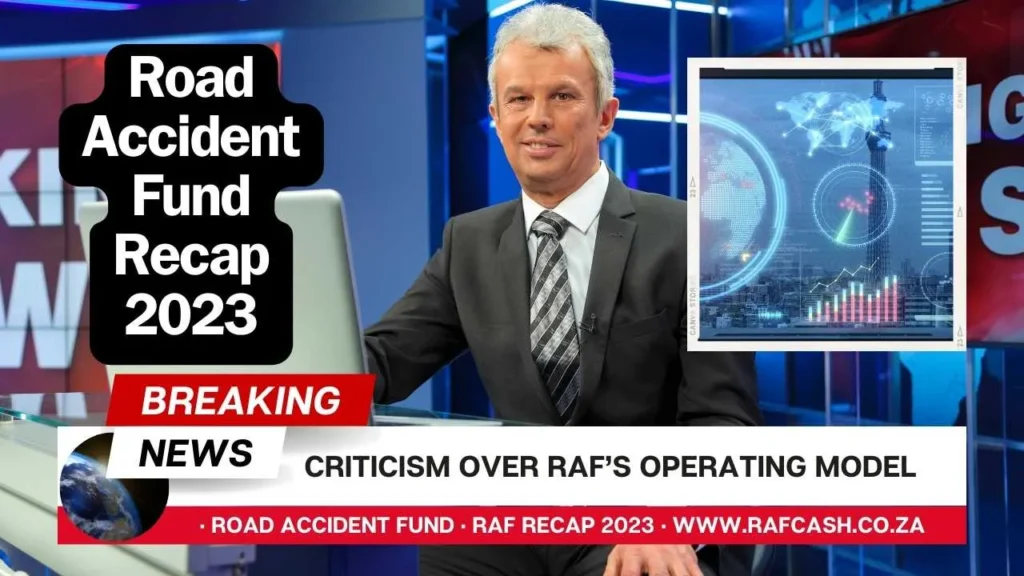
Criticism Over RAF’s Operating Model
Critiques: The Core of the Concerns
Legal Profession’s Outcry
In 2023 the South African legal profession issued a stark memorandum titled “Crisis at the Road Accident Fund“. Here they voiced their deep concerns over the current state of the RAF.
Key criticisms included:
Inadequate Leadership: The appointment of a CEO with limited legal background and understanding of litigation processes has been questioned.
This lack of expertise is seen as a fundamental flaw in the management of the RAF. The result is inefficiency and poor decision-making.
Termination of Panel Attorneys: The decision to disband the panel of attorneys is seen as a detrimental move.
Legal professionals played a crucial role in managing litigation and settlement negotiations.
This action is believed to have left the RAF underrepresented legally. This has affected the court system and lead to delays in claim settlements.
Unlawful Directives: Specific directives from the RAF have been criticized.
In particular those regarding the repudiation of claims for past medical expenses paid by medical aids,(see above).
These have been challenged in court, with rulings against the RAF. This again highlights the organization’s refusal to comply with established legal norms and court orders.
Amended Claims Submission Requirements: New stringent requirements for claim submissions have been criticized for being overly restrictive and not considering the principle of substantial compliance.
This change is perceived as hindering the submission of legitimate claims, affecting vulnerable road accident victims.
Public and Parliamentary Perception
National Disaster Label: The chairperson of parliament’s Standing Committee on Public Accounts (SCOPA) has publicly labeled the RAF as a national disaster!
Reflecting a broader public and governmental concern about the state of the organization.
RAF’s Response: Their Stance Amidst Criticism
Denial of Blame
The RAF’s management, including the Deputy Minister of Transport, has shifted the blame for the organization’s challenges to the legal profession.
This narrative has been criticized for being unsubstantiated and deflecting from the RAF’s internal issues.
Legal Battles
The RAF has engaged in legal battles against court orders and directives.
This has added further strain in its relationship with the legal community and other stakeholders.
Resistance to Change
Despite the criticisms and legal rulings, there seems to be a reluctance within the RAF to acknowledge the validity of the concerns raised by various groups.
Doing so will require a change of heart. And then a change of action!
| How does this affect you? The RAF’s criticized operational practices could lead to delays and complexities in claim processing, impacting timely compensation. |
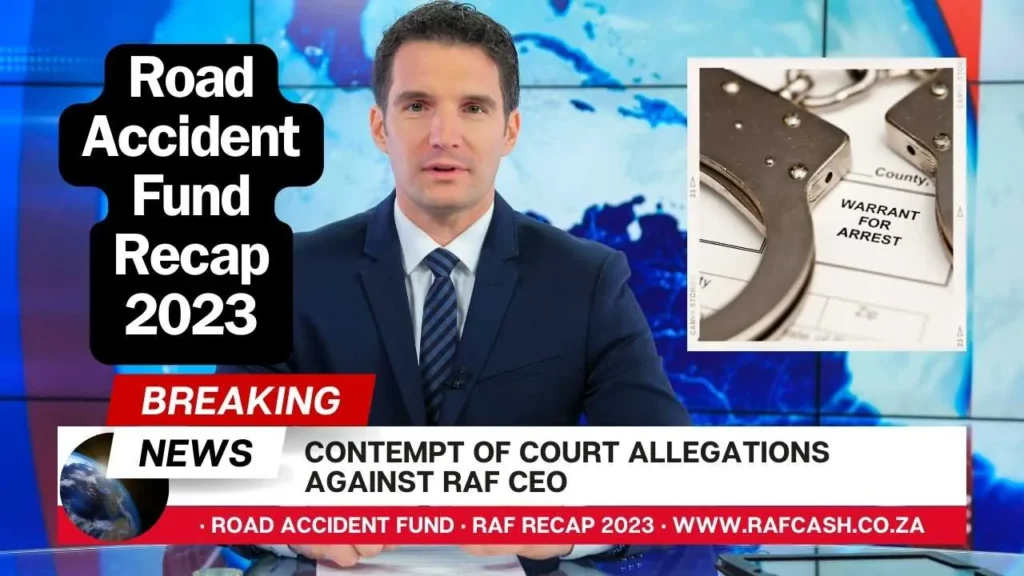
Contempt of Court Allegations Against RAF CEO
Allegation Details: The Genesis of the Crisis
Context of the Allegations
The Road Accident Fund (RAF) CEO has been embroiled in a contentious situation. He is facing serious allegations of contempt of court.
This situation stems from a series of decisions and actions taken under the CEO’s leadership that have raised legal and ethical concerns.
The allegations primarily revolve around the RAF’s non-compliance with court orders and its handling of claims and legal procedures.
It is unlikely that this will be resolved in 2023. And so we can again expect more of the same from the 2024 RAF news highlights.
Specific Accusations
The accusations against the CEO include:
- Failure to Comply with Court Orders: The RAF, under the CEO’s direction, is accused of not adhering to judicial directives. Particularly regarding the payment of claims and legal expenses.
- Directive on Past Hospital and Medical Expenses: The CEO’s directive instructing RAF claims handlers to repudiate claims for past medical expenses paid by medical aids is a focal point. This directive was deemed unlawful by the courts. Yet the RAF reportedly continued its implementation.
- Handling of Litigated Matters: The decision to terminate the RAF’s panel of attorneys and the subsequent handling of litigated matters have been criticized.
This move allegedly led to the RAF being unrepresented in court. The result – a surge of default judgments against the organization.
Legal Proceedings: The Judicial Response
Court Challenges
The legal profession, including various attorneys’ associations and individual claimants, has challenged the RAF’s decisions and actions in court.
These legal battles have led to several significant judgments against the RAF. The courts continue criticizing its management and operational model.
Key Legal Rulings
- Discovery Health Case: This high-profile case involved the RAF’s aforementioned directive on medical expenses. The courts overturned this directive, with the RAF unsuccessfully appealing the decision.
- Hlatshwayo and Masilela Case: A full bench of the Mpumalanga Division of the High Court delivered a comprehensive judgment, directly criticizing the CEO’s decisions and their impact on the RAF’s functionality.
Ongoing Legal Proceedings
As of the latest information, there may be ongoing legal proceedings related to these allegations, including potential contempt of court actions.
These proceedings are closely watched by legal professionals and the public.
They bear significant implications for the RAF’s future operations and leadership.
| How does this affect you? Allegations suggest potential mismanagement, which might affect the RAF’s reliability and efficiency in handling claims. |

Petrol Price Increases and RAF Fuel Levy
Economic Impact
The economic impact of petrol price increases in South Africa is multifaceted.
Especially considering the role of the Road Accident Fund (RAF) levy within this framework.
In 2023, despite the soaring fuel prices, there was no increase in the general fuel levy or the RAF levy.
The National Treasury chose instead to focus on providing tax relief to support households and the economy.
The unchanged fuel levy for the year stood at R3.85 per litre of petrol and R3.70 per litre of diesel, while the RAF levy was R2.18 per litre for both petrol and diesel.
The stable RAF levy, despite rising fuel costs, plays a crucial role in balancing the financial burden on consumers and the need for revenue to support the Road Accident Fund.
However, it’s essential to note that increases in fuel prices indirectly affect the cost of goods and services.
This is because transportation costs, which are heavily influenced by fuel prices, are a significant component of the overall costs of goods. As fuel prices rise, these increased costs are often passed on to consumers. This leads to a ripple effect across the economy.
Public Reaction
The public and governmental response to the petrol price hikes and the RAF levy has been varied. On one hand, the decision to not increase the RAF levy was likely seen as a measure to alleviate some of the financial pressures faced by consumers.
On the other hand, concerns about the sustainability and management of the RAF fund persist.
The Automobile Association (AA) of South Africa has emphasized the need for better management and governance of the RAF. This is alongside improved road safety, better traffic policing, and investments in alternative forms of public transport.
These measures are suggested not only to mitigate the impact of rising fuel costs but also to reduce the demand on the RAF.
The AA also points out that misappropriation of funds and corruption are issues that need to be addressed.
In summary, the stability of the RAF levy in 2023 provided some relief against the backdrop of rising fuel prices.
However, it also highlighted the ongoing challenges in managing the fund to meets its intended purpose. This, without imposing an undue burden on South African motorists and the economy at large.
| How does this affect you? Stable RAF levies amidst rising fuel prices might limit the fund’s growth, potentially impacting its capacity to cover future claims. |

Fraud-Related News Involving the RAF
Fraud Prevention and Recovery
The Road Accident Fund (RAF) in South Africa has been embroiled in various fraud-related incidents. This poses significant challenges to its financial stability and operational integrity. These incidents range from internal corruption to fraudulent claims and collusion with external parties.
Major Fraud Incidents
Collusion and Corruption within RAF: One of the most alarming trends in recent years is the internal corruption within the RAF. There have been instances where RAF employees were found to be colluding with attorneys and claimants.
The result? Fraudulent claims and payouts.
This malpractice not only drains the RAF’s financial resources but also undermines public trust in the institution.
False Claims and Overbilling: False claims, including exaggerated injuries and overbilling by service providers, are another significant issue. These fraudulent activities often involve syndicates. A network of medical professionals, lawyers, and claimants working together to exploit the RAF system.
Identity Theft and Impersonation: There have also been cases of identity theft. Individuals’ personal information is used without their consent to lodge false claims with the RAF.
RAF’s Measures to Prevent and Recover Funds
In response to these challenges, the RAF has implemented several measures:
- Enhanced Vetting and Monitoring: The RAF has increased its vetting procedures for both employees and service providers. This includes rigorous background checks and continuous monitoring to detect any unethical practices.
- Improved Claim Verification Processes: The RAF has strengthened its claim verification processes. This involves more thorough investigations into the claims. Included in this is further medical assessments and verifications of the circumstances surrounding each accident claim.
- Legal Action and Recovery Efforts: The RAF has been actively pursuing legal action against individuals and entities involved in fraudulent activities. This includes recovering funds from fraudulent claims and imposing legal sanctions on those found guilty of fraud.
- Partnerships with Law Enforcement: The RAF has formed partnerships with law enforcement agencies to tackle fraud more effectively. This collaboration has led to several successful investigations and arrests related to RAF fraud.
- Public Awareness Campaigns: The RAF is also focusing on public awareness campaigns. By educating the public about the consequences of fraud they are hoping to increase the reporting of suspicious activities.
- Technology Integration: The adoption of advanced technologies for claim processing and fraud detection is another critical step. This includes the use of data analytics. Artificial intelligence (AI) is also being used to identify patterns indicative of fraudulent activities.
- Whistleblower Protection: The RAF encourages whistleblowing by providing protection and anonymity to those who report fraudulent activities within the organization.
In conclusion, the RAF’s ongoing battle against fraud is crucial for its sustainability and for maintaining public confidence in its operations.
The measures implemented are a testament to the RAF’s commitment to integrity and transparency in its dealings.
However, continuous vigilance and adaptation of strategies are necessary to stay ahead of evolving fraudulent tactics.
| How does this affect you? Increased fraud prevention measures might lead to stricter claim scrutiny, potentially complicating the claim process for legitimate cases. |
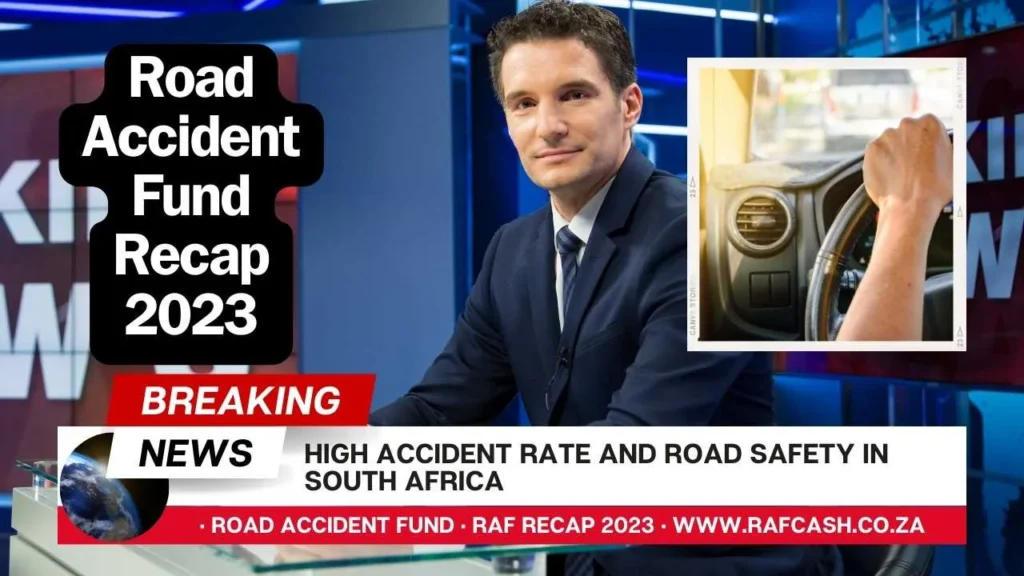
High Accident Rate and Road Safety in South Africa
Statistics and Trends
Recent data on road accidents in South Africa paints a concerning picture.
The country has been ranked as having the highest rate of fatal road accidents in the world. This is according to an analysis by an Australian insurance company.
This analysis, which compared car crash statistics from 20 countries, revealed that South Africa leads in terms of road fatalities. Specifically, the country recorded 34.9 fatalities per 100,000 for men and 9.9 fatalities per 100,000 for women.
This large gender gap in mortality rates is attributed to the lower number of women drivers in South Africa.
Adding to this alarming statistic, the Department of Transport reported that 1,451 people died in accidents during the 2022/2023 festive period.
This number, though significant, showed a slight decrease from the previous year, where 1,685 fatalities were recorded during the same period.
Link to RAF
These troubling statistics have a direct impact on the Road Accident Fund (RAF) in South Africa. The RAF faces increasing pressure and demands due to the high rate of road accidents in the country.
Each road accident potentially represents a new claim for the fund. This increases its financial and administrative burden.
The high fatality rate not only reflects the dire state of road safety in South Africa. It also underscores the vital role of the RAF in providing support to the victims and their families.
Given these trends, it’s clear that improving road safety is not just a matter of public health and welfare. It is also crucial for the sustainability of the RAF.
The fund’s ability to efficiently manage and compensate claims is closely tied to the overall safety of South African roads.
| How does this affect you? High accident rates increase demand on the RAF, which could strain its resources and affect the processing of claims. |
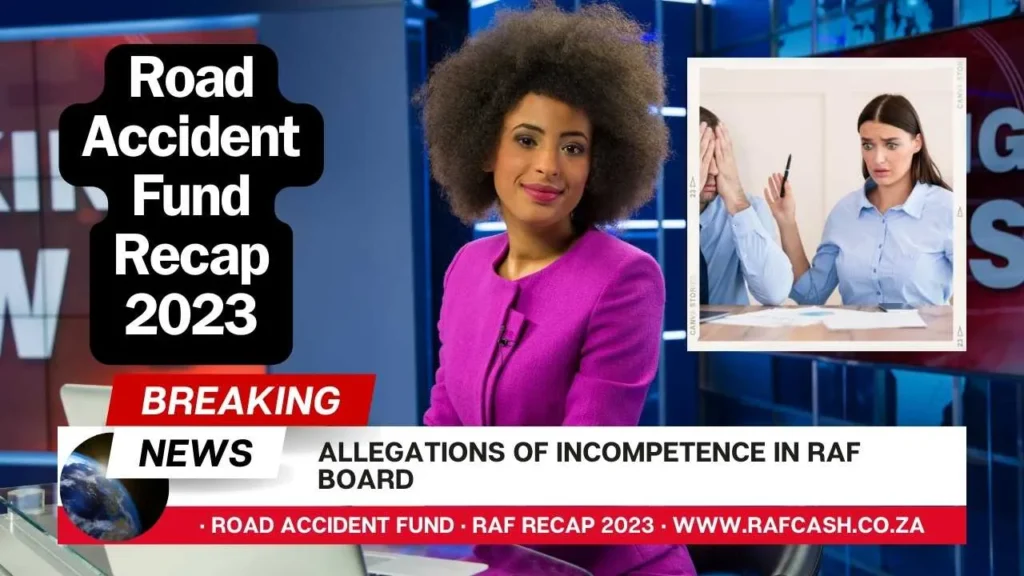
The Road Accident Fund (RAF) in South Africa has faced serious allegations of incompetence against its board.
The Standing Committee on Public Accounts (Scopa) chairperson, Mkhuleko Hlengwa, criticized the RAF board.
The key issue was its handling of a dispute with the Auditor General regarding a shift in accounting standards from IFRS4 to IPSAS 42.
This change led to a significant difference in the RAF’s reported contingent liability and insolvency position. The Auditor General, however, deemed the new standard inappropriate for a public entity like the RAF. It argued that this change misrepresented the fund’s liabilities.
Scopa urged the RAF to halt its legal action against the Auditor General over this issue. Hlengwa expressed frustration with the board’s perceived arrogance and failure to rectify the error. He emphasized the need for a competent board.
The RAF’s CEO, Collins Letsoalo, stated the board’s belief in its correctness regarding the accounting standards.
Meanwhile, the Special Investigating Unit (SIU) is probing allegations of corruption within the RAF. This includes irregularities in contracts and duplicate claim payments.
The RAF, funded by a portion of the fuel levy, has accumulated substantial liabilities, which are currently unfunded. This ongoing situation has prompted calls for the dismissal of the RAF board and raised questions about its effectiveness and governance practices.
| How does this affect you? Board mismanagement allegations might impact the RAF’s operational effectiveness, potentially hindering claim settlements and services. |
Conclusion
As we cap off a year of turbulence and transformation within the Road Accident Fund, it’s clear that the path ahead is laden with both challenges and opportunities for reform.
The stories we’ve covered provide a mere glimpse into the complex workings and pivotal shifts happening within RAF.
For those keen on navigating the intricacies of the Fund and staying informed on the latest reforms, policy changes, and impactful stories, there’s an invaluable resource at your fingertips.
Join our RAF Fact newsletter to receive meticulously curated updates.
We deep dive into the implications of legislative changes, and expert analysis on what lies ahead for South Africa’s Road Accident Fund.
Whether you’re a road user, policy enthusiast, legal professional, or simply a concerned citizen. Our newsletter is your gateway to staying informed and engaged with RAF’s evolution.
Don’t let the next headline catch you off guard. Subscribe to the RAF Fact newsletter now and be part of the conversation shaping the future of road safety and compensation in South Africa.
Frequently Asked Questions
What is the Road Accident Fund (RAF) Amendment Bill 2023?
The RAF Amendment Bill 2023 is a proposed law in South Africa aimed at overhauling the RAF’s compensation system, focusing on structured social benefits instead of traditional compensation for damages.
How does the RAF Amendment Bill 2023 affect claimants?
The Bill limits claim coverage, excludes general damages like pain and suffering, and changes compensation to annuity-based payments, potentially reducing immediate financial support for accident victims.
Why is there a dispute between medical aids and the RAF?
The dispute centers on the RAF’s refusal to reimburse medical aids for treating road accident victims, leading to a financial burden shift to medical schemes and their members.
What were SCOPA's main concerns in their investigation of the RAF?
SCOPA focused on RAF’s duplicate payments, payment issues with medical experts, internal culture, operational challenges, and backlogs in claims processing.
Why was the RAF's audit and annual report delayed in 2023?
The delay was due to RAF’s adoption of an unconventional accounting standard, leading to disagreements with the Auditor General and internal management issues.
What are the implications of petrol price increases on the RAF fuel levy?
Despite rising fuel prices, the RAF fuel levy remained unchanged in 2023, balancing consumer financial burden with the need for RAF funding, but raising concerns about the fund’s sustainability.
How is the RAF addressing fraud within its system?
The RAF is combating fraud through enhanced vetting, improved claim verification processes, legal actions against fraudulent activities, partnerships with law enforcement, public awareness campaigns, and technology integration.
What is the impact of South Africa’s high road accident rate on the RAF?
The high accident rate increases the RAF’s financial and administrative burden due to a rising number of claims, highlighting the need for improved road safety and efficient claim management.
What are the allegations of incompetence against the RAF board?
The RAF board faces allegations of incompetence related to mishandling a dispute with the Auditor General over accounting standards and broader governance issues, prompting calls for their resignation.
What changes are proposed in the RAF’s operating model?
Proposed changes include restricting coverage and compensation types, focusing on direct accident victims, and operational adjustments to address inefficiencies and legal challenges.



